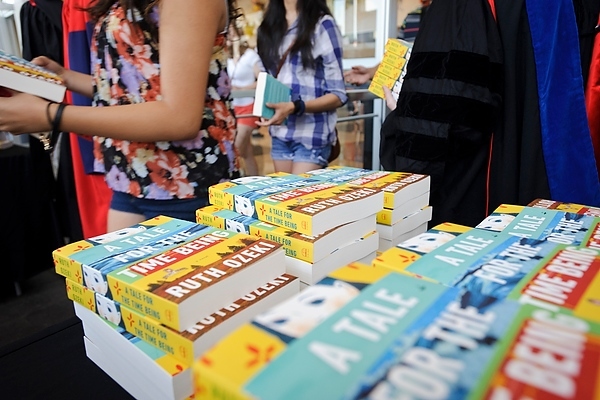UW campus community digs into “A Tale for the Time Being”

Volunteers distribute complimentary copies of “A Tale for the Time Being” following the Chancellor’s Convocation at the Kohl Center Aug. 30. The book is the 2013-14 selection for Go Big Read, a UW–Madison common-reading program designed to engage students, faculty, staff, alumni and community members in a shared, academically focused reading experience.
“A Tale for the Time Being” is a sprawling book that spans both time and the globe, but at heart, it’s a story about the relationship between a writer and a reader.
A novelist on a remote Canadian island — who bears more than a passing resemblance to author Ruth Ozeki — finds a diary, written several years earlier by a troubled teenage girl in Tokyo. The diary washes ashore following the 2011 earthquake and tsunami in Japan, tragic events that served as a catalyst for Ozeki to rework the book she had been writing since 2006.
“I found that just absolutely devastating. I spent weeks, months watching the footage of the wave just demolishing these small towns,” Ozeki said in a recent interview. In the aftermath of the disaster, which included the nuclear meltdown at Fukushima, she realized the book she had been writing was irrelevant. “It changed everything. The world was different,” she said.
The new novel from the critically acclaimed and best-selling author is the selection for the fifth year of Go Big Read, UW–Madison’s common-reading program. For this year’s program, Go Big Read organizers encouraged the campus community to suggest fiction titles that fit into a theme of global connections. Ozeki’s novel, which also made the shortlist for this year’s Man Booker Prize, hooked Go Big Read selection committee members with the inventive narrative that alternates between two characters.
“One of Ozeki’s gifts is capturing the voice of young people and introducing a number of social and environmental issues throughout her narrative…”
Lynn Keller
“Through complete happenstance, they create a bridge between themselves and across time — though, as the book wonders, perhaps this connection didn’t occur by chance after all,” UW–Madison Chancellor Rebecca Blank told more than 5,000 new students who attended the Chancellor’s Convocation prior to the start of the fall semester.
Ozeki, who is also a documentary filmmaker and a Zen Buddhist priest, draws on history, myth, quantum physics and Zen philosophy as the diary’s author and its reader try to find meaning in their lives.
Students will identify with the courage and curiosity of Ozeki’s characters, says David Zimmerman, a professor of English who has previously taught Ozeki’s work. “What makes Ozeki’s novels so rich is that these characters exist at the intersection of different cultures and remote arenas of experiences,” he says. “As we follow their stories, we learn a great deal about the ways that culture, geography, gender and other social influences shape individuals’ searchings and sufferings.”
Students in Lynn Keller’s modern literature course will read both “A Tale for the Time Being” and one of Ozeki’s earlier novels, “My Year of Meats.” The course is part of a First-Year Interest Group, “Nature and Culture: How Humans Interact with the Environment,” and Keller, a professor of poetry in the UW’s English department, says both books will help students “get a broad sense of the many environmental challenges we face.
“Ozeki’s work is bracingly contemporary, filled with up-to-the-minute references to technology and popular culture.”
Timothy Yu
“One of Ozeki’s gifts is capturing the voice of young people and introducing a number of social and environmental issues throughout her narrative, such as bullying or the Fukushima nuclear accident or global warming,” Keller says.
Timothy Yu, an associate professor of English, has been a fan of Ozeki’s work since reading her first novel in graduate school and says she “adopts quirky, unexpected perspectives” on current events. Yu will teach “A Tale for the Time Being” in his modern American literature course this semester.
“It brilliantly brings together some of the main themes I’ll be pursuing in our study of American literature: the relationship between newness and tradition, and the central role of race and culture,” he says. “Ozeki’s work is bracingly contemporary, filled with up-to-the-minute references to technology and popular culture.”
Ozeki’s visit to campus, scheduled for late October, will include a public talk on Oct. 28 at 7 p.m. at Varsity Hall in Union South. Copies of “A Tale for the Time Being” were distributed to first-year students at the convocation and to students enrolled in courses that are using the book. During fall semester, the book will be included in at least 50 courses in disciplines including anthropology, English and physics. Many student and staff book groups across campus are also reading and discussing Ozeki’s novel.
In addition, the Madison Public Library, which partners with the Go Big Read program each year, is hosting book discussions during September, October and November at nine branches, as well as workshops on journal making and writing Japanese characters. More than 1,000 people have checked out “A Tale for the Time Being” from the Madison Public Library since the book was selected in May.
